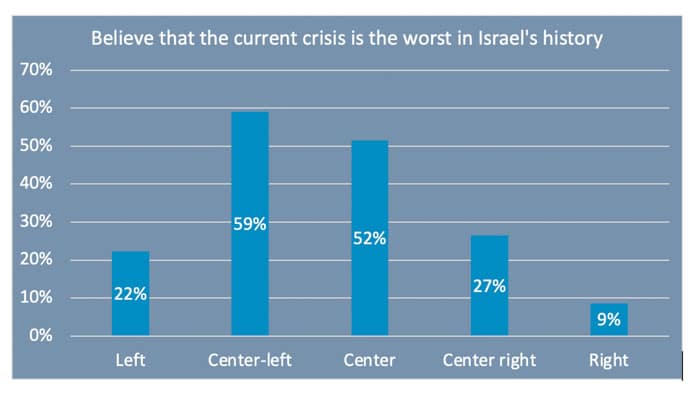 Sean Gallup/Getty Images
Sean Gallup/Getty Images Prime Minister Benjamin Netanyahu had always been a street fighter. His long reign as Israel’s most consequential leader had begun when half the country was in the streets, supporting or opposing the Oslo Accords, then mourning the untimely murder of Prime Minister Yitzhak Rabin. His long reign might end — with him its always premature to make a certain prediction — when half the country is in the streets. On Monday, Netanyahu smelled blood in the water. It was his own blood, and he surely wondered if other Likud leaders can smell it too.
Every leader of many years must face his “let them eat cake” test. A leader must isolate the need to be immune from the ebbs and flows of passing moods and focus on his strategic goals — but also must not miss seismic shifts that could ruin him. “Let them eat cake” is an international symbol of rotten leadership, of governments that could no longer see the people behind the heavy curtains of the palace. If Netanyahu peeked out the window on Sunday, around midnight, as hundreds of thousands of Israelis spontaneously took to the streets, he might have had his Marie Antoinette moment. He was warned time and again — by, among others, his own handpicked Defense Minister, the one he sacked in an abrupt move that sent stunned Israelis to the streets – and was still blindsided.
How can such experienced leader, such cautious leader, err in such a way? Israelis wonder about this quandary, some blame the destabilizing influence of Netanyahu’s family members, some believe it is his criminal trial, still others assume he was always like this, only we didn’t pay enough attention. Whatever the cause, on Sunday the tables turned on him in more than one way. First, Netanyahu was forced to halt the legislation that ignited the crisis. Second, the topic of conversation became more him than the laws his coalition was promoting. People were saying he lost it, he is a “present danger,” he must go.
On Tuesday, he wasn’t yet ready to go. He was maneuvering, buying time, appeasing his partners, attempting to calm the country without seeming weak. It was almost pathetic, and there’s nothing a politician fears more than looking pathetic. Hence, Netanyahu and his ministers spend hours haggling over the fine details of their looming surrender, as if they could find a way so nuanced of halting the legislation as to prevent the public from seeing their shame.
And it is a shame. Three months of time wasted, emotions high, feelings hurt, raptures widened. And what for? The coalition could easily pass a mild, reasonable, judicial reform. The coalition could compromise and move on to dealing with other things. It chose the way of the radicals, the way of all or nothing, until reality came calling: Not even a parliamentary majority can win against everybody. Labor Unions and industrialists brought the country to a halt. Security chiefs warned of a clear and present danger. Right-winger leaders cried: here’s proof that the elites are in control. Well – yes, at least somewhat in control. Good for Israel that it still has elites on which it can rely when a kooky government of radicals attempts to change the rules without restraint or reason.
What comes next is not easy to predict. So much of what happened in the last couple of weeks was inconceivable, so much of it was incredible, that one thing we’ve learned: we are sailing in uncharted waters, with captains at the helm who have mediocre skills and rusty compasses. They want north, but strong winds push them east; they steer west while undercurrents sweep them south.
“We aren’t going back to where we were” was a cry one could easily get from protestors and leaders. Not going back to what? Going forward to where? You can’t expect all the answers in one week.
It could lead to a moderate reform and back to business as usual, it could lead to more clashes over more issues, it could lead to early election, or early retirement of Netanyahu, or government reshuffle. It could lead to many things but at least for now it feels as if history was made this week, as if Israel had somehow changed. A silent majority needed a wakeup call, and it is now awake. A liberal majority that was starting to feel like a minority was reminded that it is still a majority. “We aren’t going back to where we were” was a cry one could easily get from protestors and leaders. Not going back to what? Going forward to where? You can’t expect all the answers in one week.
Something I wrote in Hebrew
When the Knesset decided to pass legislation that retroactively “cancels” the disengagement from northern Samaria I wrote the following:
Of course, if it turns out that it works, that it is possible to undo past events, it would be a shame to settle for disengagement. Why not continue to cancel more events. The second intifada, the assassination of Rabin, the inflation of the 1980s, the Yom Kippur War, the list is long … And if you want an ambitious plan, you can pass a law now that in five years will retroactively cancel the legal reform crisis. Not the reform — which may or may not have to be canceled. We will eliminate the crisis itself. Basically, this is merely an upgrade proposal. We will not only jump from the present to cancel the past — we will jump to the future to cancel the present.
A week’s numbers
When Israelis tell us this crisis is the worst ever, they mean, among other things “worse than the Yom Kippur War.”

A reader’s response:
Ilya Rochavsky writes: “Do Israelis not see the Iran is very close to having a nuclear weapon?”
Answer: They do (see), but what can they do (to prevent it)?
Shmuel Rosner is senior political editor. For more analysis of Israeli and international politics, visit Rosner’s Domain at jewishjournal.com/rosnersdomain.























 More news and opinions than at a Shabbat dinner, right in your inbox.
More news and opinions than at a Shabbat dinner, right in your inbox.